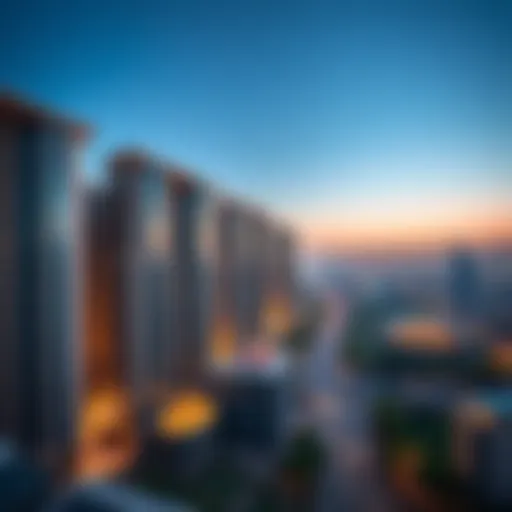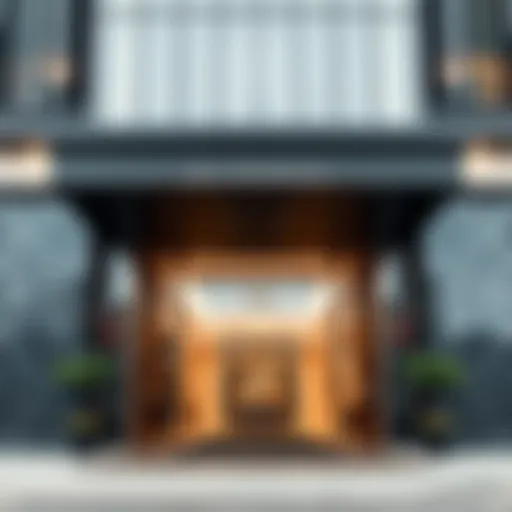Understanding Dubai House Plans: A Complete Guide
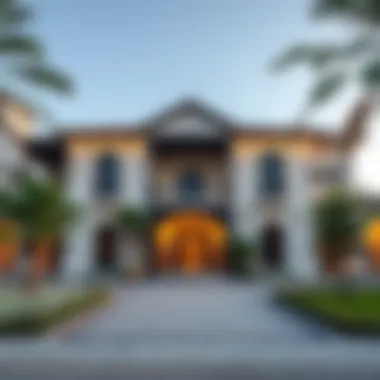
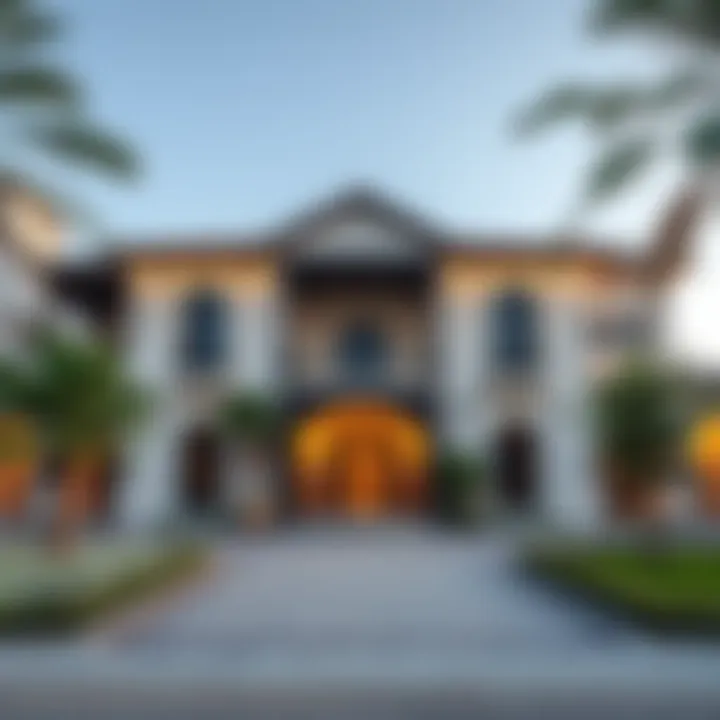
Intro
Dubai’s property market is truly like no other on the globe. A bustling metropolis where ancient traditions meet futuristic visions, it prides itself on an array of house plans that cater to diverse tastes and investments. Whether one is eyeing a lavish villa in Palm Jumeirah or a sleek apartment in Downtown Dubai, understanding the nuances of house plans is vital for navigating this dynamic real estate landscape.
Factors like architectural uniqueness, regulatory standards, and market dynamics shape the house planning process in this city. As you sift through options, this guide will help illuminate intricate details that could influence your investment decisions.
Property Market Overview
Current Market Trends
The Dubai real estate scene ebbs and flows with global economic currents, and currently, it is on an upward trend. Recent data from the Dubai Land Department indicates that the market is experiencing robust activity, driven by both local and international interest. It seems that buyers are continually drawn in by the promise of luxurious lifestyles and high potential returns on investments.
Among the standout trends:
- Increased Demand for Eco-Friendly Properties: Buyers are looking for homes that not only offer luxury but also sustainability features, such as solar panels and green spaces.
- Rise of Off-Plan Properties: Many investors are now opting for off-plan projects in anticipation of lucrative gains upon completion. This trend reflects a shift as buyers look for fresh developments that suit modern aspirations.
- Growing Popularity of Family-Oriented Neighborhoods: Areas like Arabian Ranches and Dubai Hills Estate are taking the spotlight, placing family needs at the forefront.
Key Neighborhood Insights
To make informed decisions, knowledge of key neighborhoods is essential. Some notable areas include:
- Dubai Marina: This area is favored for contemporary high-rise living and offers a vibrant lifestyle with a myriad of shops and restaurants.
- Jumeirah: Known for its upscale residences, it provides proximity to beaches and schools, attracting families and expatriates.
- Downtown Dubai: The iconic Burj Khalifa adds prestige to this area. It combines commercial and residential options, making it a prime choice for investors.
Each neighborhood tells its unique story, intertwined with the economic and cultural threads that make Dubai a global hub. Investment should align not just with current trends but also with personal preferences and lifestyle scenarios.
"The essence of successful investment in Dubai's real estate lies as much in understanding the community as in knowing the market value."
Buying and Selling Guidelines
Navigating the Dubai real estate landscape can be daunting, but with the right approach, it can be straightforward.
Essential Steps for Buyers
- Define Your Budget: Have a clear financial plan, considering not just the purchase price but also additional costs like management fees, property taxes, and maintenance.
- Conduct Thorough Research: Analyze properties online or through agents; personal visits can help substantiate decisions.
- Seek Professional Assistance: Engaging a licensed property consultant can provide valuable insights and simplify complex transactions.
- Understand the Regulatory Framework: Familiarize yourself with the legalities involved in property ownership, which can differ significantly from other markets.
Tips for Sellers
- Set the Right Price: Research similar properties and set a competitive price to attract buyers quickly.
- Enhance Property Appeal: Simple renovations or good staging can significantly increase interest.
- Utilize Quality Marketing: High-quality photography and compelling property descriptions can grab attention in a crowded market.
- Choose the Right Agent: Partner with a knowledgeable real estate agent who understands the conditions and dynamics within your neighborhood.
Each step in the buying and selling process requires due diligence and careful navigation to ensure a favorable outcome in Dubai’s vibrant property market.
Prelude to House Plans in Dubai
Dubai's real estate scene is a whirlwind of opportunity and ambition, making it crucial for potential buyers, investors, and developers to get a solid grasp on house plans within this dynamic landscape. A house plan is far more than just a blueprint; it encapsulates lifestyle, function, and reflection of the city's unique spirit.
When navigating the housing market, understanding the intricacies of house plans can offer several benefits. First off, these plans serve as a foundation for making informed decisions. Whether you're a seasoned investor or a first-time buyer, knowing the layout and design elements can help you align your choices with personal or financial goals.
Moreover, with a plethora of options — from opulent villas, modern apartments, to charming townhouses — knowing what works in terms of space, design, and locality greatly eases the process of finding the right property.
A key consideration when examining house plans is how they adapt to various lifestyles. Each neighborhood in Dubai carries its unique ambiance; some may be more suitable for families while others cater to professionals seeking vibrant urban life. Hence, a well-thought-out house plan not only elevates functionality but also enhances the living experience in diverse settings, from the serenity of Jumeirah to the bustling atmosphere of Dubai Marina.
This understanding equips buyers and investors with necessary knowledge, reducing the odds of misalignment with their expectations and investment goals. The regulatory framework and market trends also interplay in house planning, influencing everything from architectural style to financial viability.
In summary, this exploration of house plans in Dubai offers a roadmap for navigating through a landscape that is both expansive and intricate. Recognizing these elements helps in unearthing the potential housed within this vibrant market.
"The aim of house planning in Dubai is to create an environment that respects its heritage while embracing modernity."
With this essential context, let’s dive deeper into unique architectural styles that make Dubai a true marvel in the realm of real estate.
Architectural Styles Unique to Dubai
Dubai stands as a beacon of architectural ingenuity, reflecting a vibrant tapestry of styles that echo its rich history and forward-looking ambitions. The uniqueness of Dubai's house plans can be traced directly to its architectural styles, which not only define the aesthetic appeal but also influence the cultural identity of the region. By recognizing the various styles, potential homeowners and investors can appreciate the nuances and considerations involved in selecting a property in this dynamic city.
Influences from Islamic Architecture
Dubai's architectural fabric is woven from the threads of Islamic traditions. The use of intricate geometric patterns, pointed arches, and elaborate tilework create structures that are visually stunning yet deeply symbolic. For instance, the Sheikh Zayed Grand Mosque serves as a prime example where the blend of functionality and expressive art comes to life through its many domes and minarets.
Islamic architecture emphasizes natural light and ventilation, fostering a sense of harmony with the environment. More importantly, the concept of privacy is paramount, often manifesting in thoughtful layouts that direct views inward rather than outward. This is particularly valuable in a bustling city like Dubai where personal space can be a luxury.
Additionally, the application of traditional motifs into contemporary designs fosters a connection between the old and the new, enriching the skyline while preserving cultural heritage. Homebuyers should consider these aspects as they explore properties that not only offer modern conveniences but also resonate with historical significance.
Contemporary Designs Shaping the Skyline
As much as Dubai is defined by its Islamic heritage, it is equally characterized by contemporary architectural wonders. The Burj Khalifa, the tallest building in the world, is a testament to modern engineering prowess and design innovation. Its sleek lines and futuristic silhouette capture the essence of a city in perpetual growth.
Contemporary designs in Dubai often reflect sustainability principles, focusing on energy-efficient materials and renewable resources. The trend towards integrating smart home technologies also influences modern developments. Homebuyers can benefit from features like automated lighting and temperature control, which enhance the livability of a space while reducing environmental impact.
Dubai's real estate landscape is evolving continuously, with developers aiming to create iconic structures that impress yet serve practical needs. Understanding these trends can empower investors to make informed decisions on future properties—those that are likely to appreciate as demand for unique living experiences grows.
Fusion of Traditional and Modern Elements
One of the distinctive characteristics of house plans in Dubai is the successful blend of traditional and modern architectural principles. The Al Fahidi Historical Neighborhood illustrates this beautifully, showcasing structures that preserve coral stone and gypsum while incorporating contemporary building techniques.
This fusion demonstrates that modern comforts need not come at the expense of cultural integrity. Homes that combine open, well-lit spaces with traditional courtyards and intricate woodwork strike a balance between opulence and simplicity, allowing owners to enjoy the best of both worlds.
For instance, a villa might feature the clean lines of modern architecture paired with Arabic mashrabiya screens, offering aesthetic appeal while providing shade and privacy. This approach not only enhances design but also promotes a sustainable way of living that respects the local climate.
As potential buyers or investors seek to enter the market, understanding this unique blend can guide them in selecting a property that reflects their lifestyle preferences while maintaining a connection to Dubai’s rich architectural narrative.
"Dubai’s architecture is not merely about buildings; it’s about expressing an identity rooted in history yet oriented towards the future."
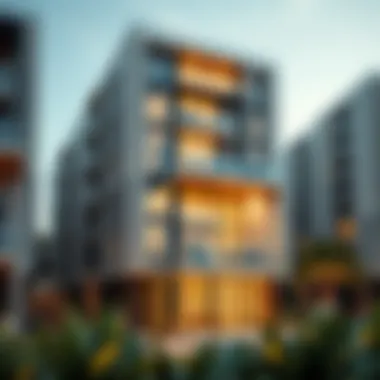
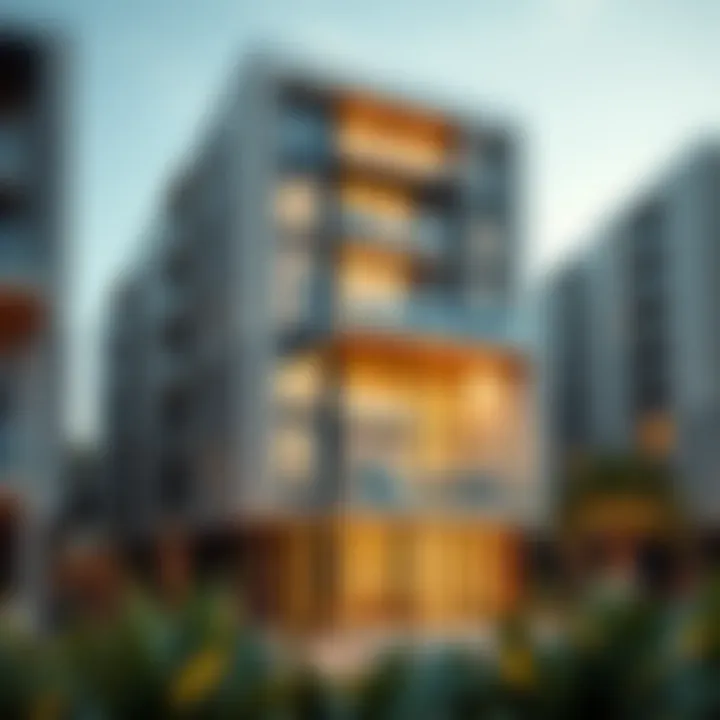
Ultimately, the architectural styles unique to Dubai represent a celebration of both heritage and innovation, setting the stage for informed and inspired decision-making in the real estate market.
Regulatory Framework Surrounding House Plans
The regulatory framework governing house plans in Dubai plays a crucial role in shaping the real estate landscape. It establishes the guidelines that architects, builders, and homeowners must adhere to when undertaking residential projects. Understanding these rules is essential, as they ensure safety, sustainability, and aesthetic coherence across the city. These regulations also protect the rights of residents and help maintain property values.
Among the benefits of a robust regulatory framework is the cultivation of urban order. It helps in preventing haphazard development, thereby promoting a balanced and well-structured environment. Moreover, compliance with these regulations fosters a sense of community and shared responsibility among citizens. Homeowners and builders alike should grasp the importance of these laws — they not only provide a legal foundation but also enhance the overall living experience in Dubai.
Understanding Dubai’s Urban Planning Laws
Urban planning laws in Dubai are shaped by its unique geographical, cultural, and economic context. At their core, these laws aim to ensure the city develops harmoniously while addressing the demands of its growing population.
- Master Planning: Dubai’s strategic vision encompasses various master plans, which outline future urban development initiatives. The Dubai Urban Plan 2040, for instance, seeks to enhance liveability and create a sustainable urban environment.
- Zoning Regulations: Different zones are designated for residential, commercial, and industrial use. These zoning laws dictate the type of structures allowed in specific areas and help prevent conflicts between different land uses.
- Building Codes: Each construction project must comply with strict building codes that cover safety standards, materials used, and architectural aesthetics. This maintains a pleasant aesthetic while ensuring the safety of buildings.
- Cultural Considerations: The laws also reflect Dubai's cultural values, promoting Islamic architecture and local traditions in new developments. This is evident in public spaces, parks, and residential designs that aim to resonate with local heritage.
To be successful in the Dubai real estate market, one should familiarize themselves with these urban planning laws. Keeping oneself updated about amendments and developments can prove invaluable for investors and buyers when evaluating property potential.
Permitting Processes for Home Builders
Navigating the permitting processes for home construction can feel like running an obstacle course, especially for those not well-versed in local regulations. However, understanding this process will aid in smoothening the journey of building a home.
The permitting process generally involves several key steps:
- Pre-Application Consultation: It is advisable for builders to engage with the Dubai Municipality prior to submitting a formal application. This meeting can clarify requirements and discuss compliance issues.
- Submission of Plans: Builders must submit detailed architectural plans, which will be assessed against local regulations. This can include everything from landscape design to utility infrastructure.
- Permit Approval: After thorough evaluation, the relevant authorities will issue permits. This approval is a green light for the construction to commence.
- Inspections: During the building phase, regular inspections are carried out to ensure compliance with safety codes and approved plans. This step cannot be overlooked, as it is integral for securing final occupancy permits.
- Final Certification: Once the project is completed, a final inspection will take place. Upon meeting all conditions and requirements, the builder will receive a completion certificate, allowing homeowners to legally occupy the property.
Understanding this intricate permitting process can save considerable time and resources for builders and investors. Proper planning, attention to detail, and adherence to the guidelines laid out by municipal authorities are vital for anyone looking to embark on building a home in Dubai.
"Navigating Dubai's regulatory framework is not just a necessity; it's a pivotal step towards ensuring a successful investment in your future."
Key Considerations for Home Buyers
When venturing into the realm of real estate, particularly in a bustling market like Dubai, understanding the nuances of home buying is crucial. Numerous factors influence the selection and acquisition of property, which can ultimately shape not just living conditions but also long-term investment returns. Numerous layers come into play, making it essential for buyers to be well-informed before diving in.
Evaluating Property Locations
When purchasing property, one might say location is king. This age-old adage rings particularly true in Dubai, where neighborhoods can vastly differ in terms of amenities, accessibility, and overall lifestyle. Buyers should carefully assess the proximity to essential services such as schools, hospitals, and shopping districts.
- Accessibility: Consider the distance to major roads or public transport. Areas with easy access to the Metro or main highways often yield better resale values.
- Lifestyle Amenities: Look into nearby recreational facilities—parks, gyms, and dining options that enhance daily life.
- Community Vibe: Each neighborhood has its unique ambiance. Some areas cater to a bustling, urban lifestyle, while others offer a more tranquil setting.
Buyers should also research future infrastructure developments which might shape the area's appeal. Knowledge of upcoming projects can provide critical insight into how a neighborhood might develop in the years to come. Persons interested in more resources about this can refer to Dubai's Urban Planning website.
Balancing Cost and Quality
The quest for a new home in Dubai also necessitates a critical analysis of cost versus quality. Finding that sweet spot where affordability meets desirability requires in-depth market knowledge. Options available range from lavish villas to modest apartments, and understanding the market can prevent buyers from overspending or ending up with properties that lack essential features.
- Research Market Trends: Glean insights from real estate reports that discuss pricing trends in various neighborhoods. Awareness of shifting patterns helps buyers ascertain fair pricing.
- Quality Inspections: A property’s price can often indicate quality, but it’s not an absolute rule. Engaging a professional inspector helps uncover potential issues, averting future financial pitfalls.
- Assessing Investment Value: Quality materials and design can enhance a property's longevity, making it a more strategic investment over time.
Future Development Impacts
Dubai’s landscape is continually evolving, and understanding the potential impacts of future developments can significantly influence buying decisions. By keeping an eye on upcoming infrastructure projects, buyers can predict how these changes might affect property values and their own living experience.
- Urban Expansions: Being aware of areas designated for expansion can be beneficial. Development plans often aim for economic growth, increasing demand for housing in those regions.
- Public Transport Developments: Projects aimed at improving transit can lead to higher property values. Living near a newly developed metro station or bus terminal can significantly increase convenience.
- Market Research: Regularly check updates on major projects in Dubai—publications, news outlets, or urban planning documents provide valuable information to help make informed decisions.
In summary, being a home buyer in Dubai requires more than just browsing listings. Evaluating property locations, balancing cost against quality, and considering future developments provides a comprehensive approach. For investors and home buyers, the right considerations can lead to a worthwhile venture in this vibrant city.
"In a market as dynamic as Dubai's, being prepared with the right information can make all the difference between a sound investment and a costly mistake."
For further reading on property investment strategies in Dubai, you might find resources on Investopedia helpful.
Types of House Plans Available
When diving into the world of Dubai's real estate, understanding the various types of house plans is crucial. Each option reflects not just personal taste but also lifestyle, investment potential, and practical living needs. Whether you are an investor seeking a lucrative venture or a family looking for the perfect home, knowing the vast array of house plans allows you to make a more informed decision.
House plans available in Dubai cater to a broad spectrum of buyers, each with distinct preferences and requirements. From lavish villas to sleek apartments and cozy townhouses, the diversity in design and structure can significantly affect your living experience.
Villas and Mansion Designs
Villas in Dubai often stand as symbols of luxury and elegance. They are characterized by expansive spaces, high ceilings, and splendid outdoor areas, boasting gardens and pools. Buyers are drawn to these designs not only for their aesthetic appeal but also for the potential benefits, such as privacy and additional space for family activities. High-end villas, in neighborhoods like Emirates Hills or Dubai Hills, can fetch impressive prices, often accompanied by premium amenities.
Investing in a villa might involve several considerations:
- Location: Areas like Palm Jumeirah or Jumeirah Beach Residence are among the most desired for villas.
- Customization Options: Many developments allow for personalized designs, accommodating the individual style of the buyer.
- Maintenance Costs: Larger spaces can mean larger upkeep. Potential owners should be prepared for ongoing maintenance.
"Purchasing a villa is not just about acquiring a property; it's about embracing a lifestyle defined by luxury and comfort."
Apartments and High-Rise Living
As the city skylines rise, Dubai's apartments are a testimony to contemporary urban living. High-rise buildings often offer breathtaking views of the city, along with convenient access to amenities like gyms, pools, and retail spaces. Apartments cater to both singles and families seeking urban convenience or investment opportunities.
Key benefits of apartment living include:
- Location: Many apartments are strategically located in the heart of bustling neighborhoods, close to shops, eateries, and public transport.
- Security and Facilities: High-rise living generally includes enhanced security and shared facilities, contributing to a more communal lifestyle.
- Investment Returns: Given the population boom, apartments often provide good rental yields, making them attractive to investors.
Adapting to apartment life involves understanding:
- Space Restrictions: Unlike villas, apartments may have limited space, impacting family dynamics.
- Community Living: Living in close proximity to others can foster community, but it might also require compromise on privacy.
Townhouses and Duplex Options
Townhouses and duplexes present a middle ground, balancing the appeal of individual family homes with the practicality of shared community living. They often feature multiple stories, allowing for distinct living spaces without the price tag of a villa. These types of homes are particularly popular among young families and first-time buyers.
Considerations for this style of home include:


- Cost-Effectiveness: Generally, townhouses are priced lower than villas, paving the way for more affordable entry points into the market.
- Layout Flexibility: Multi-level designs can offer a unique layout, allowing for varied living arrangements.
- Community Feel: They often come in clusters where residents engage with neighbors, promoting a sense of community that can be appealing.
As you consider these options, remember that each design type has notable advantages and disadvantages specific to your circumstances. Knowing the differences can help you align your choice with your lifestyle goals.
Financing House Plans in Dubai
When it comes to financing house plans in Dubai, understanding the ins and outs is crucial for anyone looking to invest or reside in this vibrant city. The financial aspect often lays a foundation for the entire buying process, directly influencing the choices available to buyers, whether they are new homeowners or seasoned investors. Knowledge of the financing landscape is not just an optional accessory; it's a necessity. Without grasping the fundamental elements of mortgages, down payments, and local banking systems, one may find navigating the real estate waters more difficult than expected.
The process of obtaining financing in Dubai is multi-faceted. Various options are available, along with specific requirements that can impact your overall budget and project timeline. By understanding these elements, buyers can better position themselves to make informed decisions that align with their financial capabilities and investment goals.
Mortgage Options and Requirements
In Dubai, mortgage options have expanded significantly over the years, catering to both expatriates and locals alike. The primary types of mortgages include fixed-rate and variable-rate mortgages.
- Fixed-rate Mortgages: These offer the advantage of stability, as the interest rate remains unchanged throughout the loan period, allowing for consistent monthly payments.
- Variable-rate Mortgages: In contrast, these can fluctuate according to market trends, which may seem appealing during times of low interest rates but can turn troublesome if rates soar.
Requirements for mortgages generally include the following:
- A valid residency visa
- Proof of income, usually in the form of salary slips or bank statements
- A good credit history
Every bank might have its nuances, so it's essential to compare different lenders for favorable terms that suit your financial situation. Establishing a relationship with a local bank or mortgage broker can also provide insights into specific product offerings that might not be readily advertised.
Understanding Down Payment Norms
The down payment is often a decisive factor in the financing equation. For expatriates, the minimum down payment can typically range from 20% to 25% of the property value, whereas UAE nationals may enjoy lower requirements.
To break it down:
- First-time buyers often face a higher down payment, typically around 25%.
- Subsequent property purchases may permit as low as 20% down, depending on the property's value.
Analyzing these norms is critical because the way one structures their down payment can significantly affect long-term financial commitments. An increased down payment may reduce monthly payments but can deplete immediate cash resources.
Navigating Local Banking Systems
Navigating the local banking systems might have its fair share of complexities, especially if you hail from a different banking culture. Dubai's financial institutions generally offer mortgage services tailored for buyers from various backgrounds. However, understanding which banks are reputable and which ones might have stringent criteria can save time and stress.
- Documentation: Be prepared to provide detailed documentation, including your income, residency status, and credit history.
- Language Barriers: While English is widely spoken, some nuances may still be present. It's beneficial to have someone familiar with the local real estate jargon to help you along the way.
- Customer Service: Not all banks provide the same quality of customer service. Talking to current customers or reading online reviews can help identify institutions you want to work with.
Sustainability in House Designs
Sustainability in house designs is not just a trend; it has become essential in today's complex urban scenario, especially in rapidly developing regions like Dubai. Governments and communities are recognizing the importance of creating homes that minimize environmental impact while maximizing comfort and efficiency. This section unpacks the various dimensions of sustainable house designs and highlights their significance within Dubai's unique context. The benefits of sustainable designs ripple through the economy, ecology, and social fabric, providing long-term advantages for investors and homeowners alike.
Eco-Friendly Building Materials
In Dubai, the discussion on eco-friendly building materials has gained momentum amid rising concerns about excessive waste and resource use. Traditional materials, which predominantly rely on non-renewable resources, can be replaced with options that are both sustainable and efficient. Building with materials such as recycled concrete, bamboo, and reclaimed wood not only results in a smaller carbon footprint but can also enhance aesthetics and create unique character in homes.
Utilizing materials sourced locally also reduces the energy consumed in transportation, addressing a core element of sustainability. For instance, materials like eternal stones and sandstone, prevalent in local architecture, offer durability and timeless aesthetic appeal while being less taxing on resources.
The adaptation of green roofing systems, constructed with sustainable plants and vegetation, improves insulation as well. It serves a dual role by attracting biodiverse species and providing additional cooling, thereby reducing energy use.
Energy Efficiency Standards
Energy efficiency standards are vital for any sustainable building project, and Dubai is taking significant strides in this area. The goal is to reduce overall energy consumption in both residential and commercial properties. Houses designed with energy efficiency in mind can not only cut costs for owners but also decrease the strain on local utilities.
Implementing technologies such as energy-efficient lighting and appliances, smart home systems, and advanced HVAC systems forms the backbone of sustainable house plans. These systems optimize energy usage, causing less environmental harm while offering homeowners tangible fiscal benefits.
Dubai has introduced specific regulatory benchmarks that compel developers and builders to adhere to sustainability measures. The Dubai Clean Energy Strategy 2050 is a testament to this commitment, aiming to provide 75% of the city's energy from clean sources by that year.
Incorporating solar panels, for instance, not only aligns with these standards but also provides a renewable source of energy. Homeowners who invest in such technologies may find themselves reaping financial rewards through reduced utility bills and, in certain cases, government incentives.
"Sustainable house designs are not merely a preference; they are a necessity for harmonizing profit with responsibility."
As the market evolves, buyers and investors increasingly prioritize sustainability when making decisions, seeking properties that balance modern conveniences with eco-friendliness. Ultimately, promoting sustainability in house designs not only fulfills the immediate needs of residents but also ensures a healthier and more sustainable environment for future generations in Dubai.
Interior Design Trends in Dubai
Dubai's interior design landscape is vibrant and ever-evolving, reflecting the city's unique blend of cultures and the impact of its rapid development. The importance of understanding these trends cannot be overstated, particularly for investors, buyers, and developers aiming to make informed purchasing or design decisions. An in-depth comprehension of prevailing interior design trends can significantly enhance property appeal and lead to better investment returns. In this section, we will explore two key aspects of interior design in Dubai: popular decor styles and maximizing space and functionality.
Popular Decor Styles
The decor styles in Dubai are as varied as its population, ranging from opulent and extravagant to minimalist and modern.
- Arabesque Influences: Many homes incorporate traditional Arabesque elements, showcasing intricate geometric patterns and ornate designs. This style often reflects the rich cultural heritage of the region.
- Modern Aesthetic: A growing number of residents opt for sleek and contemporary decor emphasizing clean lines and open spaces. This design aims to create a calming atmosphere amid the city's hustle and bustle.
- Eclectic Mix: Another trend gaining traction is the fusion of styles—mixing vintage furniture with modern artwork, creating a personalized and inviting space. Homeowners often blend different influences to convey their unique taste and lifestyle.
- Sustainable Decor: With increasing awareness around sustainability, many are choosing eco-friendly materials and practices in interior design. This trend includes using reclaimed woods, non-toxic paints, and energy-efficient appliances.
Maximizing Space and Functionality
In a metropolis like Dubai, where space can be at a premium, maximizing available area is essential. Interior designers are employing various techniques to create both functional and aesthetically pleasing environments.
- Open-Plan Layouts: These continue to be a favorite, providing flexibility for residents. Combining kitchen, dining, and living areas allows for better flow and can make smaller spaces feel larger.
- Multi-Functional Furniture: As many households have limited space, innovative furniture that serves multiple purposes—like sofa beds or expandable dining tables—becomes a practical choice. This kind of design ensures that every square meter in a home is utilized effectively.
- Vertical Space Utilization: Many designers are now incorporating vertical storage solutions to make the most out of height in a room. This strategy not only minimizes clutter but also draws the eye upward, creating an illusion of more space.
- Smart Home Technology Integration: Incorporating technology such as smart lighting, heating, and even security systems can enhance convenience, comfort, and efficiency—all crucial factors in modern living.
"Space is not just about square footage; it is about how we utilize what we have in an increasingly crowded world."
Understanding these interior design trends in Dubai is vital for anyone looking to invest in or develop real estate in the area. For those who appreciate the interplay between function, beauty, and cultural influences, keeping an eye on these trends can lead to smarter investments and a more gratifying living experience.
The Role of Real Estate Agents
Real estate agents are the navigators of the intricate waters of Dubai's property market. They serve as a bridge between buyers and sellers, ensuring smooth transactions in a landscape that can be bewilderingly complex. The reason why these professionals are indispensable lies in their deep understanding of local market trends, regulations, and best practices. When it comes to house plans specifically, their expertise can alleviate the common hurdles faced by both investors seeking residential properties and local buyers looking to stake their claim in the city.
Selecting the Right Agent
Choosing the right real estate agent can make or break your experience in the Dubai housing market. Think of it like picking a travel guide for a city you've never visited. An effective agent should not only be knowledgeable about Dubai's specific neighborhoods but also be adept at handling the nuances of various property types—be it lavish villas, high-rise apartments, or charming townhouses.


Here are some essential factors to consider when selecting the right agent:
- Experience and Track Record: Look for an agent with a proven history in Dubai’s real estate scene. Their past successes can give insight into their ability to help you navigate your housing journey.
- Local Knowledge: An agent who knows the ins and outs of the neighborhoods will be able to offer unique insights that online listings often lack. They can provide information on future developments, market shifts, and more.
- Clear Communication: An agent should communicate effectively and promptly. If they are slow to respond to initial inquiries, it may be a red flag for future communication challenges.
- Reviews and Recommendations: Speaking to past clients or reading online reviews can provide perspective on an agent's professionalism. Websites like Reddit and Facebook can be valuable resources for real testimonials.
Finding this right match may require some legwork, but it's worth every hour spent.
The Buying Process Simplified
Navigating the buying process can feel intimidating, especially in a city as bustling as Dubai. Here, real estate agents can simplify the journey, making it smoother and less stressful.
Here’s how agents can facilitate the buying process:
- Initial Consultation: This first step helps to clarify your requirements, be it budget, location, or type of property. A good agent listens carefully to gather the right information.
- Property Search: Once the criteria are set, agents leverage their network and access to databases to curate a tailored list of suitable properties.
- Viewings and Inspections: Agents organize property viewings and assist in assessing the homes with a critical eye. They can highlight features you may overlook and suggest essential inspections to consider.
- Negotiation: Negotiating a fair price is crucial, and agents bring their experience to the table, advocating for your best interests.
- Closing the Deal: Finally, they guide you through the offers, paperwork, and legalities involved in closing the sale, ensuring all bases are covered.
"A trusted agent will do more than just close a deal; they will take the time to educate you through each step of your purchase."
Utilizing the expertise of a real estate agent not only saves time but can lead to a more favorable deal, allowing you to secure your dream home without unnecessary hiccups. In Dubai’s competitive property market, the right agent is an investment in your future.
Challenges in the Dubai Real Estate Market
Navigating the Dubai real estate market indeed presents unique challenges for a variety of stakeholders, including investors, buyers, agents, developers, and sellers. Understanding these hurdles is crucial not just to thrive in this vibrant market but also to make well-informed decisions that align with long-term goals. As Dubai continues to grow and evolve, the challenges within the real estate landscape shift too, making it imperative to stay ahead of the curve.
Market Fluctuations and Their Impact
Dubai's property market is notorious for its price fluctuations, often characterized by cycles of boom and bust. These changes can be attributed to several factors, including global economic trends, oil prices, and tourism rates. For investors, this volatility means that purchasing properties can feel like a two-edged sword.
When prices soar, potential buyers may rush in, hoping to cash in on expected future gains, yet such an approach can be perilous. Buying at the peak may lead to significant losses if the market subsequently corrects itself. Conversely, during downturns, the market can present great opportunities for savvy buyers who understand the timing.
- Observation of Historical Trends: Checking past market trends can provide insight into potential future behaviors.
- Analyzing Economic Indicators: Factors like GDP growth, employment rates, and overseas investment flows can provide clues on market stability.
Fluctuations often reflect larger dynamics at play. Investors should keep an ear to the ground and stay updated on economic indicators and global events that can signal a change in market conditions.
Navigating Legal Impediments
In the wake of rapid development, Dubai's regulatory landscape can be quite intricate. One of the primary challenges for anyone engaging in real estate is understanding the legalities involved in buying, selling, or renting properties. Each transaction comes with its own set of regulations, which can vary starkly depending on the property's location and type.
Considerations include:
- Ownership Laws: While freehold ownership is allowed in designated areas, other zones may have limiting regulations that require foreign buyers to navigate additional complexities.
- Property Registration: Ensuring properties are registered in accordance with the Dubai Land Department procedures is essential for avoiding future disputes and potential legal issues.
- Compliance with Local Requirements: Various permits and approvals are needed for alterations, constructions, and commercial uses, all of which come with implications for time and cost.
Being well-informed about these legal aspects can save prospective buyers and real estate professionals from headaches down the line. Engaging with legal experts who specialize in UAE real estate law is often advisable, as they can provide insights and guidance tailored to specific situations.
In summary, while the Dubai real estate market brims with potential, the challenges involved necessitate a proactive and well-informed approach. By being aware of market fluctuations and legal impediments, stakeholders can traverse this complex landscape more confidently.
Long-term Investment Strategies in Real Estate
In the vibrant and rapidly evolving landscape of Dubai's real estate market, long-term investment strategies are crucial for anyone looking to make informed property decisions. Investors, buyers, agents, developers, and sellers all have a stake in understanding how to successfully navigate this complex market. Investing in real estate traditionally offers a path for wealth building, but in a place like Dubai, it requires a discerning eye and a solid strategy.
One important aspect of these strategies lies in the property value trends. It’s not just about buying a property; it’s about timing, choosing the right location, and understanding market dynamics. Over time, the value of a property is influenced by a myriad of factors—economic indicators, demographic shifts, and the state of urban planning, to name a few.
Understanding Property Value Trends
Being aware of property value trends in Dubai can significantly enhance the potential return on investment. The city has seen rapid growth, with certain areas skyrocketing in value, while others have stagnated or experienced minor dips. Research is key. Investors should track historical price movements and forecasts supported by economic data. Local news platforms, such as property portals and market analysis reports, can be helpful. Focusing on regions that showcase infrastructural developments, new schools, and amenities can provide clues on where values may rise in the future.
"Investors who pay attention to local trends often have the advantage, as they can identify properties that may appreciate over time more effectively than those who follow general market trends."
Gentrification and Its Effects
Another layer to consider in long-term investment strategies is the impact of gentrification. In many parts of Dubai, old neighborhoods are being redeveloped. This gentrification often leads to increased property values in those areas. However, it’s a double-edged sword. While some investors may profit from these rising values, the effect on long-time residents can create tension. Monitoring areas that are undergoing gentrification can offer opportunities, but investors should be aware of the social implications and strive for a balance between profit and community impact.
It's also essential to recognize that gentrification can shift the demographic landscape and influence rental markets. As newer, affluent residents move in, there may be spikes in rental prices, and this could draw more investment interest. In light of this, investors must assess the sustainability of such growth and whether it can withstand broader economic fluctuations.
Future Prospects for House Plans in Dubai
The real estate landscape of Dubai stands at the crossroads of tradition and innovation, making it imperative to understand the future prospects of house plans in this vibrant city. As Dubai continues to evolve as a global hub for business, tourism, and luxury living, the future of residential designs seems promising. Key elements guiding this evolution include technological advancements, shifts in consumer preferences, and sustainable development practices.
Emerging Developments
As development projects proliferate throughout Dubai, keeping an eye on emerging trends is crucial for buyers and investors alike. The city has recently witnessed a surge in mixed-use developments, where residential, commercial, and leisure spaces coalesce in harmonious design. One prime example is the Dubai Creek Harbour, a new community poised to redefine modern living with its waterfront properties and innovative urban design.
Furthermore, smart home technology is becoming the norm rather than the exception. Features like automated systems for lighting, security, and temperature control not only enhance comfort but also contribute to energy conservation. Homebuyers today are looking for homes equipped with these technologies, reflecting a clear shift toward tech-savvy, modern living environments. In essence, the homes of the future in Dubai are becoming more than mere shelters; they’re evolving into efficient, intelligent ecosystems.
Urban Expansion and Sustainability Goals
Urban expansion in Dubai is not just about constructing new buildings; it's about creating sustainable communities that can support a growing population without compromising the environment. The UAE government has set ambitious sustainability targets that require integrating green spaces, energy-efficient technologies, and eco-friendly materials into house plans. Statistically, a study by Masdar Research shows that energy-efficient homes can reduce overall consumption by up to 30%, a figure that's hard to ignore for budget-conscious buyers and environmentally conscious investors alike.
One aspect of this urban growth is the increased availability of public transportation options, which allows for easier access to residential areas. This not only makes properties more attractive to potential buyers but also supports a shift away from car dependency. The integration of transport systems with new housing developments creates a cohesive urban fabric, further enhancing the appeal of house plans in places like Dubai.
"To thrive in the evolving landscape of Dubai’s housing market, it is essential for stakeholders to adapt to regulatory changes that support sustainability while meeting consumer demands for modern design."
End: The Evolving Landscape of Dubai House Plans
In the context of Dubai's housing market, understanding the evolving landscape is crucial. The city is a melting pot of diverse cultures, traditions, and innovations—elements that are significantly reflected in its architectural styles and house plans. With rapid growth and development, prospective buyers, investors, agents, and developers need to stay updated about the changes unfolding within this vibrant market.
One key aspect is the architectural evolution driven by both tradition and modernity. The city embraces its roots through Islamic architecture while simultaneously incorporating contemporary design trends that reflect global influences. This fusion creates a unique appeal, which attracts a wide array of people looking for residential investments in Dubai. It's not simply about bricks and mortar; it's about a lifestyle that encapsulates luxury and comfort, defined by the aesthetics of the buildings that house residents.
Regulatory frameworks are also undergoing a transformation. As the demand for housing continues to rise, Dubai’s urban planning laws adapt to ensure sustainable development. Awareness of these regulations can greatly benefit investors and buyers. Compliance with the latest regulations will save individuals from potential legal hassles and increase the likelihood of successful investments. This is particularly important, as the market can shift unexpectedly, and being informed allows stakeholders to pivot and adapt their strategies accordingly.
Moreover, financing options are gaining flexibility, which supports a broader range of buyers. Traditional mortgage routes are being complemented with innovative financing solutions, making it easier for potential homeowners to enter the market. Understanding these financial dynamics can empower buyers to make informed decisions, as they can now balance affordability with quality.
As the societal demand for eco-friendliness grows, sustainability in house plans is taking a front seat. Prospective homeowners now look beyond traditional design elements to consider energy-efficient systems and environmentally responsible choices. This shift not only addresses environmental concerns but also represents a forward-thinking approach to personal investment.
"Evolving house plans in Dubai are not just about constructing buildings; they encapsulate a vision for a sustainable and inclusive future for its diverse residents."
In essence, a comprehensive understanding of these elements fosters not just a better decision-making process but also an enriched living experience that defines life in one of the world's most dynamic cities.
For more insights, you can check out Dubai Land Department and resources available on Wikipedia's page about Dubai.





